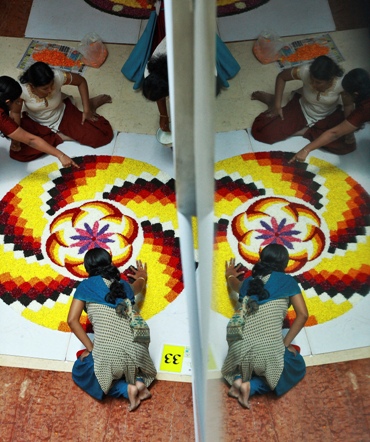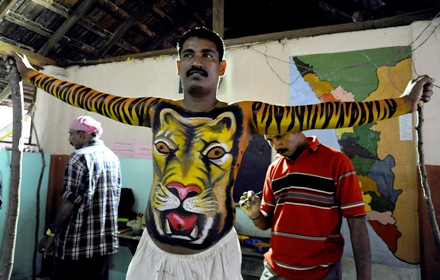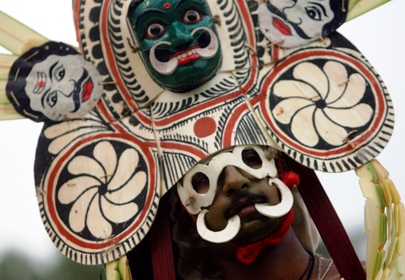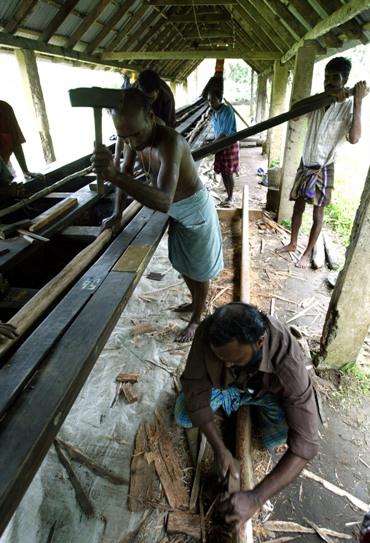 | « Back to article | Print this article |
Kerala, a 'Dubai' for Bengali migrants
It is ultimately ironic that a state that witnessed much of its male population voyage to the Gulf in search of work is now home to a more domestic story of mass migration.
Bengali migrants who call Kerala their 'Dubai' can be seen filling the massive labour gap in the state by toiling away in a gamut of industries, from construction sites, to petrol pumps, to hotels, tea estates and even paddy fields.
Every week, workers come together in Gandhi Park in the capital which in effect becomes an informal labour market.
From there, they go to the work site that offers the highest wage.Click NEXT to read further. . .
Kerala, a 'Dubai' for Bengali migrants
Kanai, a migrant who hails from Murshidabad, Bengal, has been scrupulously saving -- sending most of his earnings home -- and using income derived from working overtime hours for his living expenses.
While food may be an issue -- they apparently can't stomach the ubiquitous coconut oil -- workers are happy with the wages they get in Kerala which range from Rs 250 to Rs 350 a day.
Kanai's supervisor calls the boys Rs pavam pilleru' or harmless lads.
He pays Kanai Rs 290 which is less than the wages unskilled workers from Kerala generally get.
But it is three times what Kanai would get in Bengal. In return, the Bengalis are all praise for the state.
Click NEXT to read further. . .
Kerala, a 'Dubai' for Bengali migrants
Says Tarun, Kanai's cousin who has been here for two years, "People here are unlike anyone we have met. There are no bad people here!''
Tarun's euphoria is perhaps fueled in part by the free health care that Kerala offers migrants, something that he probably never got in his own state.
Migrants can be seen at government dispensaries in Kerala which provide free consultation and medicines.
This mutual bonhomie wasn't always the case.
A majority of workers are Muslims and this triggered the usual 'Bangladeshis are infiltrating' fears as well as other paranoias.
"In fact. I was slightly worried when I saw some graffiti in Bangla on the walls of our site one day," says Jayanthan Namboodiripad, managing partner of Lotus Constructions, which has been building residential flats in Tripunithura, a wealthy suburb of Ernakulam.
Click NEXT to read further. . .
Kerala, a 'Dubai' for Bengali migrants
"I wondered if they were Naxals or terrorists. So far there has been no problem,'' he adds.
He says the building associations have ramped up the task of registering workers and providing them health cards.
Not to be outdone, the state government and the trade unions have introduced a new scheme for migrant worker's welfare where every contractor with more than five workers has to give their details to the Additional Labour Commissioner.
"However, this is never enforced and will have implications on labour law violations as well as security", says K Kamalan of the Bharatiya Mazdoor Sangh in Kerala.
Click NEXT to read further. . .
Kerala, a 'Dubai' for Bengali migrants
The new Congress led United Democratic Front government recently issued notices to all builders' associations to issue identity cards and to register each of the migrant workers at their sites.
There is a threat of cancellation of projects in the absence of these measures, says Namboodiripad of Lotus.
There are 500,000 to 700,000 workers of which the majority are Bengalis. But there is nothing on government records, says Kamalan.
Professor Irudaya Rajan of the Centre for Development Studies in Thiruvanthapuram says that the state has to do its own studies every year.
Click NEXT to read further. . .
Kerala, a 'Dubai' for Bengali migrants
"Unless you record their presence, how do you extend welfare measures to them?" Rajan asks.
Meanwhile the remittances from Kerala has seen Kanai's village in Chouapara panchayat go red.
Brick houses are coming up everywhere, replacing thatched huts.
Migrant workers are sending home money like never before, says Kanai. Tarun's parents have bought land worth three lakh rupees with the money he has sent so far.
Tarun plans to stay on forever. "I will marry a girl from here," he announces, though he adds he has not found anyone as yet.






